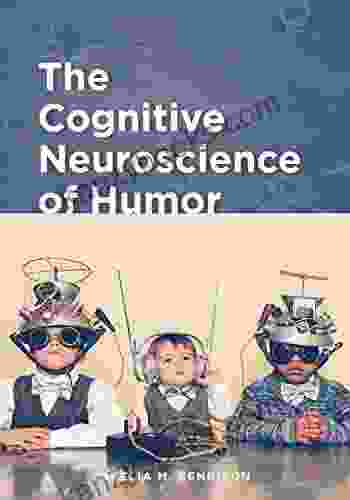The Cognitive Neuroscience of Humor: Exploring the Brain's Funny Bone


4.1 out of 5
| Language | : | English |
| File size | : | 9259 KB |
| Text-to-Speech | : | Enabled |
| Screen Reader | : | Supported |
| Enhanced typesetting | : | Enabled |
| Print length | : | 231 pages |
What makes us laugh? Why do some people find certain things funny while others don't? The cognitive neuroscience of humor is a relatively new field of study that seeks to answer these questions by examining the neural mechanisms underlying humor.
One of the most important insights from this research is that humor is not a single, unitary phenomenon. Rather, it is a complex process that involves multiple cognitive and emotional systems. These systems include:
- Attention: Humor requires us to pay attention to the details of a situation in Free Download to identify the incongruities or unexpected elements that make it funny.
- Memory: We must be able to recall past experiences and knowledge in Free Download to make sense of the humor in a situation.
- Language: Humor often relies on wordplay, puns, and other forms of linguistic playfulness.
- Emotion: Humor can evoke a wide range of emotions, including laughter, joy, and surprise.
The cognitive neuroscience of humor has also helped us to understand the individual differences in humor. For example, some people are more likely to find certain types of humor funny than others. This is likely due to differences in personality, culture, and life experiences.
The study of the cognitive neuroscience of humor is a fascinating and rapidly growing field. By understanding the neural mechanisms underlying humor, we can gain a better understanding of what makes us laugh and why. This knowledge can be used to develop new therapies for people with disFree Downloads that affect humor, such as depression and autism.
How to Develop a Sense of Humor
If you're not naturally funny, don't despair. There are a number of things you can do to develop a sense of humor. Here are a few tips:
- Expose yourself to different types of humor. Read funny books, watch comedy movies, and listen to stand-up comedy. The more you're exposed to humor, the more likely you are to find things funny.
- Practice making jokes. Even if you're not naturally funny, you can still learn to tell jokes. Start by practicing with friends and family. The more you practice, the better you'll become at it.
- Don't be afraid to laugh at yourself. One of the best ways to develop a sense of humor is to be able to laugh at yourself. This doesn't mean that you should make fun of yourself all the time, but it does mean that you shouldn't be afraid to admit your mistakes or imperfections.
Developing a sense of humor takes time and practice. But if you're willing to put in the effort, it's a skill that can bring you a lot of joy and laughter.
The Benefits of Humor
Humor has a number of benefits, both physical and mental. These benefits include:
- Reduced stress: Humor can help to reduce stress levels by releasing endorphins, which have mood-boosting effects.
- Improved mood: Humor can help to improve mood by increasing levels of serotonin, which is a neurotransmitter that is associated with happiness.
- Increased creativity: Humor can help to increase creativity by fostering a playful and open-minded attitude.
- Improved social skills: Humor can help to improve social skills by making people more likeable and approachable.
- Reduced pain: Humor can help to reduce pain by distracting people from their discomfort.
Humor is a powerful tool that can be used to improve our lives in many ways. So next time you're feeling down, try to find something to laugh about. It might just be the best medicine.
4.1 out of 5
| Language | : | English |
| File size | : | 9259 KB |
| Text-to-Speech | : | Enabled |
| Screen Reader | : | Supported |
| Enhanced typesetting | : | Enabled |
| Print length | : | 231 pages |
Do you want to contribute by writing guest posts on this blog?
Please contact us and send us a resume of previous articles that you have written.
 Book
Book Novel
Novel Page
Page Chapter
Chapter Text
Text Story
Story Genre
Genre Reader
Reader Library
Library Paperback
Paperback E-book
E-book Magazine
Magazine Newspaper
Newspaper Paragraph
Paragraph Sentence
Sentence Bookmark
Bookmark Shelf
Shelf Glossary
Glossary Bibliography
Bibliography Foreword
Foreword Preface
Preface Synopsis
Synopsis Annotation
Annotation Footnote
Footnote Manuscript
Manuscript Scroll
Scroll Codex
Codex Tome
Tome Bestseller
Bestseller Classics
Classics Library card
Library card Narrative
Narrative Biography
Biography Autobiography
Autobiography Memoir
Memoir Reference
Reference Encyclopedia
Encyclopedia William Evans
William Evans Stephanie S Larsen
Stephanie S Larsen Susan B Dopart
Susan B Dopart Steve Behling
Steve Behling Martin Brown
Martin Brown Tim Woodruff
Tim Woodruff Shira Glassman
Shira Glassman Skye Michael Conroy
Skye Michael Conroy Uma Majmudar
Uma Majmudar Tracy Strauss
Tracy Strauss Stephen Lawson
Stephen Lawson Mary Yuter
Mary Yuter Scott P Alcott
Scott P Alcott Stacey O Gorman
Stacey O Gorman Sarah Sophia
Sarah Sophia Sophie Michell
Sophie Michell Savour Press
Savour Press Vlad Gemstone
Vlad Gemstone Marcia Monroe
Marcia Monroe Robert Spencer
Robert Spencer
Light bulbAdvertise smarter! Our strategic ad space ensures maximum exposure. Reserve your spot today!
 Mason PowellFollow ·13.8k
Mason PowellFollow ·13.8k Melvin BlairFollow ·6.6k
Melvin BlairFollow ·6.6k Ernest ClineFollow ·7.7k
Ernest ClineFollow ·7.7k Zachary CoxFollow ·14.1k
Zachary CoxFollow ·14.1k Charles DickensFollow ·9.7k
Charles DickensFollow ·9.7k Ismael HayesFollow ·11.9k
Ismael HayesFollow ·11.9k Ryan FosterFollow ·11.2k
Ryan FosterFollow ·11.2k Donald WardFollow ·10.6k
Donald WardFollow ·10.6k

 Virginia Woolf
Virginia WoolfGetting High Fat Diet Easily Using Keto Fat Bomb Cookbook
Unveiling the Power of Fat...

 Milan Kundera
Milan KunderaAre You Cryin' Brian? Find the Inspiration and Humor in...
Life can be full of...

 Edmund Hayes
Edmund HayesUnlock Your Vitality: The 15-Day Natural Energy Boost...
Are You Ready to...

 Gavin Mitchell
Gavin MitchellMultiple Sclerosis Life Expectancy: Unveiling the Impact...
Multiple Sclerosis (MS) is a...

 Gabriel Garcia Marquez
Gabriel Garcia MarquezGet The Thighs That Can Crack Man Head Like Walnut
Are you tired of weak, flabby...
4.1 out of 5
| Language | : | English |
| File size | : | 9259 KB |
| Text-to-Speech | : | Enabled |
| Screen Reader | : | Supported |
| Enhanced typesetting | : | Enabled |
| Print length | : | 231 pages |













